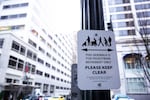
Signs prohibit people from blocking pedestrian traffic in front of the Columbia Sportswear Flagship Store in Downtown Portland.
Ericka Cruz Guevarra / OPB
Outside the Columbia Sportswear flagship store in downtown Portland Saturday, signs instructing pedestrians to keep the sidewalk clear were instead covered with posters that read "Mayor For Sale."
The covered signs designate sidewalks for pedestrian use only under city code. A product of the city's Sidewalk Management Plan, the so-called "no-sit zone" prohibits people from blocking pedestrian traffic in busy downtown areas.
About 40 protestors sat anyway, opposing city policy they say criminalizes homelessness in favor of businesses like Columbia Sportswear. Cities across Oregon continue to grapple with the same question of whether such policies actually criminalize homelessness.
"When you criminalize things that only homeless people have to do, you're criminalizing homelessness," said Portland Resistance organizer Gregory McKelvey. "Human beings need to sit and to rest, and to simply say that homeless people should not be around here is not as a solution."
Mayor Ted Wheeler instructed the Portland Police Bureau and the city's transportation agency to expand the no-sit zone downtown, the Portland Mercury reported Wednesday.
On Twitter, Wheeler — seemingly responding to criticism of the action — said it was "irresponsible" to conflate homelessness with crime.
"We can address safety issues with common sense enforcement," Wheeler tweeted. "We can address homelessness with compassion. That's our plan."
PPB Sgt. Ryan Bren said the Bureau had not instructed its officers to enforce the signs.
"The Police Bureau is taking no action currently with respect to the signs that have been put up," Bren said. "The Police Bureau has not been given any specific direction to enforce it and that is not our intention."
Protestors saw the move as suspect in timing. About two weeks prior to the mayor's announcement, Columbia Sportswear CEO Tim Boyle wrote a guest column in the Oregonian/OregonLive urging city leaders to address safety downtown. Boyle said his employees have reported being harassed and threatened by people near the downtown office.
"We are so concerned that we brought together senior management this week to talk through the challenges and options for addressing it, including a review of whether to stay downtown," Boyle wrote.
Related: For Some Homeless Oregonians, Dogs Are More Than A Luxury
In March, Eugene City Council launched a pilot program that restricted dogs on public property in specific areas of the city's downtown. The Register-Guard reported the majority of people cited in the first six months of the program were homeless.
Last month, a proposal to expand Medford's downtown "exclusion zone" failed in a city council meeting. The zone is off-limits for 90 days to people cited for civil offenses like possession of a controlled substance or failure to control dangerous dogs.
The expansion sought to include buildings such as the Jackson County Courthouse and the District Attorney’s Office.
At the Nov. 2 council meeting, Medford Mayor Gary Wheeler said the zone was not intended to criminalize homelessness but to discourage bad behavior in the city's downtown corridor and to encourage thriving businesses, an idea mirrored in Boyle's op-ed.
"I love Portland," Boyle wrote in his op-ed. "But as the chief executive officer of a company based here, I am concerned I may have made a mistake when we recently relocated one of our brand headquarters downtown."
Medford council members who voted against the expansion of the exclusion zone worried the plan would not address homelessness head-on.
"I mean maybe it will come to what council member Kay Brooks suggested: that we’ll just squeeze [homeless people] out of town," council member Clay Bearnson said at the meeting. "I just don’t know if that’s very effective or if that’s a good way to spend tax dollars."